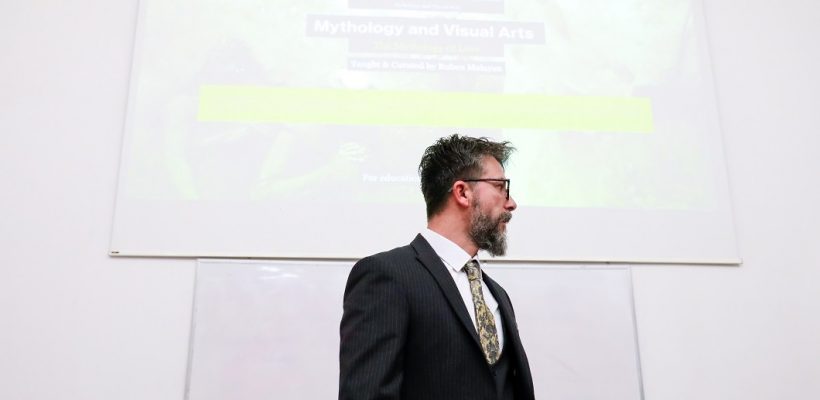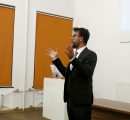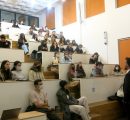
‘When Love Rises, Opposition Vanishes’: A Lecture With Ruben Malayan
3 min readYEREVAN, Armenia — On November 24, 2021, the Office of Student Affairs of the American University of Armenia (AUA) organized a lecture with AUA adjunct lecturer, an award-winning art director and visual artist, Ruben Malayan.
The presenter tackled the captivating topic — the mythology of love — inviting the attending students to explore the ancient perceptions of love and their reappearance in modern times.
Asked about the reason for choosing this topic for the colloquy with students, Malayan explained: “These are very difficult times. We are probably going through the hardest time both on individual and collective levels. And love is the answer! If we don’t know how to deal with life, love can set us free by helping us to break the limits. In general, love is a positive concept, and I wanted students to understand the captivating narratives behind this feeling. For example, Eros, the God of love, was an abstract concept. Afterwards it transformed into a young, handsome guy, and then he ended up being the little angel with the bow and the arrow. This evolution of love in mythology is interesting and worth exploring.”
Through an engaging discourse, Malayan illustrated how the perceptions of Love, Eden and Hell vary across cultures, religions and traditions, what archetypal structures and motifs are universal, and how these can inspire epic art.
As one participant commented, “The event was interactive and informative; we had the opportunity to get a multidimensional perspective on the topic from the content and visual display covered by the speaker — from ancient pieces of artwork to modern-day newspaper posters and photographs.”
The presenter walked the audience through the different types of love (whether it’s love for a friend, your child, or your significant other) by expounding the nature of those relationships and drawing parallels with mythological, religious and artistic narratives.
Within the Indian mythological frame, it was interesting to explore the differences between the teachings of Buddha and Bodhisattva. The latter, for instance, invites a person to understand that love is full of pain and sorrow, but beneficial to relieving oneself from ego and desires. “Dissolve the source of suffering — your ego — and you are free,” says Bodhisattva. All he wants is to participate in life. He doesn’t want passion, he wants compassion; in other words, he is benevolent without purpose.
“We are all part of the same chain; when you save someone, you save yourself,” emphasizes Malayan. To quote Meister Eckhart: “One who suffers for love suffers not.”
At the conclusion of the colloquy, one attending AUA student shared her impressions in these words: “What I understood is that when you love someone, you shouldn’t be selective; you should be open and stay true to yourself under any circumstance. I also learned that although there are so many differences across cultures, when it comes to love, we have so much in common.”
“I loved the dynamics of the audience. I have never seen this auditorium filled with so many people,” said Malayan. “I think it’s time to come together, to better understand one another, and to be compassionate — that’s the gist of the message I wanted to communicate to my audience.”
Founded in 1991, the American University of Armenia (AUA) is a private, independent university located in Yerevan, Armenia, affiliated with the University of California, and accredited by the WASC Senior College and University Commission in the United States. AUA provides local and international students with Western-style education through top-quality undergraduate, graduate, and certificate programs, promotes research and innovation, encourages civic engagement and community service, and fosters democratic values.




